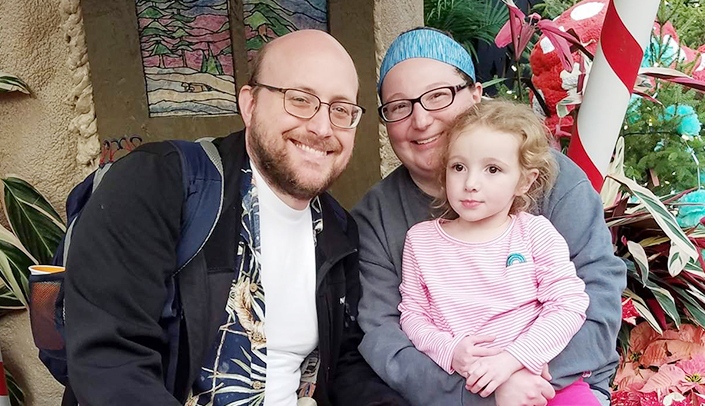Georgia Ryba has been a part-time staff member at the Munroe-Meyer Institute since September 2019.
She has been a member of the autism community since her daughter, Joy, was diagnosed on the spectrum at age 2, about three years ago.
“Well,” she said, “we had been members of the special needs world since Joy’s birth. . . but we didn’t know it until she was diagnosed.”
This August, Joy graduated from the Autism Clinic for Toddlers (ACT) Clinic, and Georgia was preparing to celebrate her first year as a part-time behavioral technician at MMI.
“I do one-on-one applied behavior analysis therapy with children on the autism spectrum ages 2-10,” she said.
Georgia worked full-time in an office when Joy was diagnosed. People were concerned, and managers were understanding, but — except for one co-worker who had a child with Down syndrome — Georgia felt disconnected.
“When I was working in a formal office setting, it was almost like I had two separate personalities. I had to walk in the door and be ‘business Georgia,'” she said. “While they were very supportive, I did have to leave things at the door.”
It wasn’t long before she left work to concentrate full-time on Joy’s therapy.
“When she got diagnosed, when we started to see the number of hours a week of therapy it took to really make progress, (my husband and I) knew we both couldn’t continue to work full time,” she said.
After Joy’s initial diagnosis from Omaha Public Schools, the Rybas took her to MMI, where they found a supportive community willing to explain things to them and connect them with resources in the community – as well as get them on the ACT Clinic’s waiting list once MMI’s Katy Menousek, PhD, had confirmed the school district’s diagnosis.
“While we were on the waitlist, we met with Dr. William Higgins, and he taught us some techniques to get Joy to use more expressive language,” Georgia said. “And then we began therapy at the ACT Clinic, and we were so fortunate to have Claire Philson as her board-certified behavior analyst (BCBA). She was so wonderful at helping us navigate what we wanted to work on; she was so nurturing with Joy. We set out the goals we wanted: more expressive language, potty training, and social skills. Joy struggles a lot with her social skills — she will play next to other children, but she doesn’t initiate with them, she won’t go up and ask them to play – she’s very introverted in that sense.”
While watching Joy work and make strides with Philson at the ACT Clinic, Georgia felt that she was now part of a community — the “special needs community,” as she put it. And, as she watched her daughter’s language blossom, as Joy became more self-reliant and social, Georgia began to feel the urge to be a larger part of that community, a positive impact on other families as Philson had influenced hers.
“I’ve seen how powerful it is when parents get these services for their children,” Georgia said. “I’ve seen the changes that can be made, and I’ve seen how difficult it can be to find qualified staff sometimes. It’s not necessarily a world that most people would just walk into without any emotional connection or some reason they’re being called to be an autism therapist.”
Georgia felt the call.
“I wanted to help other families the way MMI and others have helped us so much,” she said. “We’ve already seen a lot of change in Joy, just with the goals we had mapped out, with her being more comfortable in her surroundings. And I’ve noticed a direct correlation between her language getting stronger and her ability to navigate the world around her without fear.”
When Georgia began working at MMI, she did not feel like a novice.
“Obviously, I’d been through the coursework that everyone goes through, and I did the test and all the training to be a behavioral technician, and I still learn every day,” she said.
“When I told people I was going to leave my desk job to be an autism therapist, a lot of people asked if I could handle being a therapist during the day and an autism parent the rest of the time,” she said. “For me, I don’t get tired by that, I get almost energized by it.”
In addition, the support of her colleagues, both professionally and personally, drives her as well.
“I’m in my element at all times. I live in this world now, and I love it,” she said. “I get more support from my co-workers at MMI, because who understands better? They want to know what’s going on with Joy’s life and how she’s doing. They really care about her.”
And when it’s time to celebrate — like the ACT Clinic graduation, which corresponded with a 60-point jump on Joy’s VB-MAPP screening, a scale for verbal ability — everyone is quick to congratulate Georgia on Joy’s triumphs.
“I’ve met some of the most supportive and nurturing people,” Georgia said. “They understand how hard it can be at times and how rewarding it can be when you make those little milestones that maybe other parents just take for granted.”

How wonderful! So glad to have you at MMI Georgia!